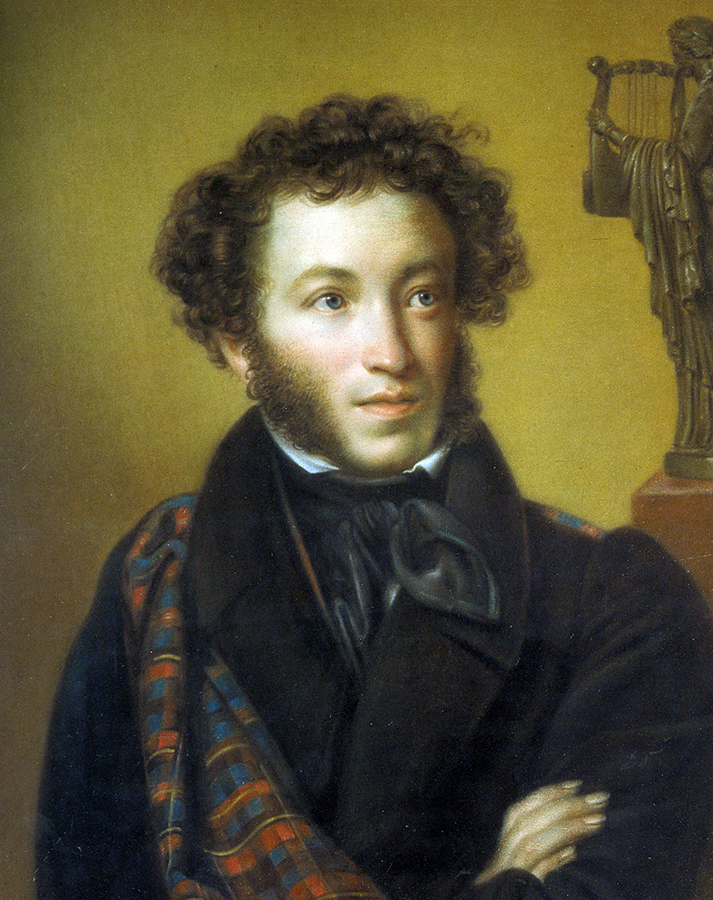Pushkin, Alexander (1799-1837), is considered Russia’s greatest poet and, by many, the greatest Russian writer of any kind. He is known as the father of Russian literature and modern Russian literary language.
His works.
Pushkin wrote in a wide variety of poetic and prose styles. He first achieved fame for long, narrative poems similar to those of the English poet Lord Byron, but he was also a master of lyric poetry and wrote plays in verse. In the late 1820’s, Pushkin turned to prose and produced a series of outstanding short stories, novellas, and novels. He was also a brilliant literary critic, letter writer, and historian. In addition to his unparalleled influence on Russian literature, Pushkin’s works provided subjects and inspiration for Russia’s leading artists, composers, and choreographers (dance composers).

Pushkin’s most famous work is Eugene Onegin (1825-1832), a novel in verse. The title character is intelligent, good-hearted, and liberal but lacks moral discipline and a serious occupation or purpose in life. As a result, he destroys himself and those around him. Much of the story deals with Onegin’s relationship with a beautiful country girl named Tatyana. These figures, the weak Eugene and the sincere Tatyana, became models for characters in later Russian literature.
Pushkin’s drama Boris Godunov (written in 1825, published in 1831), written in blank verse, introduced Shakespearean historical tragedy to the Russian stage. The play tells the story of the guilt of Czar Boris, who, Pushkin believed, had ascended to the throne by murdering the rightful heir, the infant Dmitriy. In 1830, Pushkin also wrote four “little tragedies” in verse, which were not intended for staging. The most famous are “The Stone Guest” and “Mozart and Salieri.”
Pushkin wrote lyric poems about love, nature, and the obligations of poetry and the poet in Russia. His five prose stories, the Tales of Belkin (written in 1830), differ from the conventional romantic prose of his time in their realism. “The Queen of Spades” (1834) is perhaps his most popular short story.
His life.
Alexander Sergeyevich Pushkin was born on June 6, 1799, in Moscow (May 26 by the old Russian calendar then in use). One of his great-grandfathers was a Black Ethiopian courtier to the Russian ruler Peter the Great. Pushkin took great pride in his Black ancestry and noble heritage. Even as a student, Pushkin was viewed as the great poetic genius of the nation.
The czar’s secret police began to watch Pushkin after he wrote the ode “Liberty” and several poems that criticized important government officials. In 1820, he was exiled first to southern Russia and later to his family estate, called Mikhailovskoye near Pskov. In 1826, the new czar, Nicholas I, called Pushkin to St. Petersburg and gave him a pardon. For the rest of his life, Pushkin combined writing with historical research, particularly on the reign of Peter the Great. His greatest narrative poem, The Bronze Horseman (1833), deals with that period.
In 1831, Pushkin married Natalya Goncharova, a woman in St. Petersburg society known for her beauty. His wife acquired numerous male admirers at court. Easily aroused to jealousy, Pushkin challenged one of the admirers to a duel in early 1837. Pushkin was mortally wounded and died on February 10 (January 29 on the old Russian calendar). The entire Russian intellectual community perceived his early death as a national tragedy. Pushkin’s death is the subject of great poems by several Russian writers.
